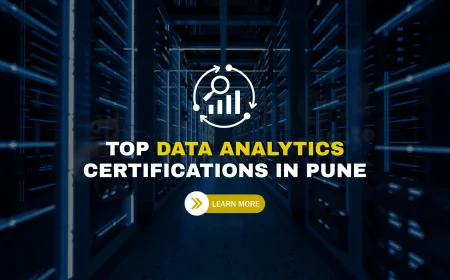Which Python Course is Best for Data Science? | Python Institute in Pune
Looking for the best Python course for Data Science? Explore top Python courses that will equip you with the skills for a career in Data Science. Join a Python Institute in Pune for hands-on training, expert guidance, and job placement support.

Data Science has become one of the most sought-after fields in the tech industry. With organizations increasingly relying on data to make strategic decisions, the demand for data scientists has skyrocketed. Python, a versatile and powerful programming language, is at the forefront of this data revolution. If you're keen on pursuing a career in Data Science, choosing the right Python course is crucial to ensure you acquire the necessary skills and knowledge.
In this blog post, we'll explore which Python course is best for data science, breaking down what you need to look for in a course, the core skills you should gain, and the best ways to advance your learning journey. Whether you're a beginner or an experienced programmer, this guide will help you navigate the vast world of Python training for data science.
Why Python for Data Science?
Before diving into the best courses, let's quickly explore why Python is a top choice for data science:
-
Libraries and Frameworks: Python offers a wealth of libraries and frameworks such as Pandas, NumPy, Matplotlib, Seaborn, and Scikit-learn. These libraries make it easier to manipulate, visualize, and analyze large datasets. Python also supports machine learning libraries like TensorFlow, Keras, and PyTorch, enabling data scientists to build sophisticated machine learning models.
-
Ease of Learning: Python's simple syntax and readability make it an excellent choice for beginners in data science. Unlike other programming languages, Python is intuitive and easy to pick up, even for those with minimal coding experience.
-
Community Support: The Python community is vast and constantly evolving. As a result, there are numerous resources—forums, tutorials, documentation, and courses—that you can leverage to learn Python for data science.
-
Flexibility: Python is incredibly flexible. It can be used for data cleaning, statistical modeling, machine learning, web scraping, and even big data processing.
With Python's incredible ecosystem of tools and resources, it's no surprise that it has become the go-to language for data science. Now, let's look at how you can get started with the best Python courses for data science.
What Should a Python Course for Data Science Include?
When searching for the right Python course, you should look for a comprehensive curriculum that covers key areas in data science. Here's what to expect from the best Python data science courses:
1. Foundations of Python Programming
Even if you're already familiar with basic programming concepts, the foundation of Python is essential. Topics should include:
-
Python syntax and data structures (lists, tuples, dictionaries, sets)
-
Functions and loops
-
Object-oriented programming (OOP)
-
Working with external libraries and modules
2. Data Manipulation with Pandas
Pandas is one of the most powerful Python libraries for data manipulation and analysis. A good Python course will teach you how to:
-
Import, clean, and preprocess data
-
Filter, sort, and group data
-
Handle missing data
-
Perform exploratory data analysis (EDA)
3. Numerical Computation with NumPy
NumPy is another essential library that helps with large-scale data operations. A great course will dive deep into:
-
Arrays and matrices
-
Mathematical operations with arrays
-
Statistical functions and random number generation
4. Data Visualization
Visualization is key to understanding your data and communicating insights. A good Python course will teach you how to:
-
Create static and interactive plots using Matplotlib and Seaborn
-
Understand different plot types and when to use them
-
Visualize relationships between variables and distributions
5. Machine Learning Fundamentals
No data science course is complete without machine learning. Expect to learn:
-
The basics of supervised and unsupervised learning
-
Regression, classification, and clustering techniques
-
How to use Scikit-learn to build machine learning models
-
Model evaluation techniques (accuracy, precision, recall, etc.)
6. Deep Learning
While deep learning is a more advanced topic, some Python courses for data science may introduce you to frameworks like TensorFlow and Keras to build neural networks and deep learning models.
7. Capstone Project
A strong Python data science course will culminate in a capstone project where you apply all the knowledge gained in real-world scenarios. This will help you solidify your skills and prepare for job opportunities.
Top Factors to Consider When Choosing a Python Course for Data Science
1. Course Duration and Depth
Some courses are designed to give you a quick overview of Python for data science, while others provide in-depth, multi-month programs. The course duration should align with your goals:
-
If you're just starting and need a quick introduction, a short bootcamp might be ideal.
-
If you want to develop a deep, nuanced understanding, a longer course with more practical exercises may be better suited.
2. Hands-On Projects and Real-World Examples
Look for courses that offer practical experience. A course with projects, exercises, and case studies will give you the opportunity to apply your skills in real-world situations, which is essential for building confidence and expertise.
3. Instructor Experience and Qualifications
Check the course instructors’ qualifications. Ideally, they should have experience in both Python programming and data science. A course taught by industry experts or data science professionals will offer insights from real-world applications.
4. Learning Style and Course Format
Some people prefer self-paced learning, while others thrive in a more structured, instructor-led environment. Consider whether the course is:
-
Self-paced: You learn on your own schedule, which is flexible but requires more self-motivation.
-
Instructor-led: Provides structured learning with direct support from an instructor.
-
Hybrid: Combines both, giving you the flexibility to work at your own pace but with periodic live sessions or check-ins.
5. Reviews and Testimonials
Before committing to a course, read reviews from previous students. Testimonials can give you a good idea of the course quality, instructor knowledge, and overall learning experience.
6. Career Support and Job Placement
A good Python course for data science should not only teach you the skills but also help you land a job afterward. Look for courses that offer:
-
Career coaching
-
Resume building
-
Job placement assistance
-
Networking opportunities with potential employers
Key Features to Look for in Python Data Science Courses
When choosing the right Python course for Data Science, it’s essential to consider the following features:
1. Hands-On Learning
Practical experience is crucial when learning Data Science. A good course should offer real-world projects, data analysis tasks, and machine learning models that you can work on.
2. In-Depth Coverage
The course should cover all the essential Python libraries like Pandas, NumPy, and Scikit-learn, with detailed lessons on data cleaning, analysis, and machine learning algorithms.
3. Structured Curriculum
A clear and structured curriculum will help guide your learning journey. Look for courses with well-defined milestones, assignments, and projects that align with industry standards.
4. Support and Community
A course that offers active support from instructors or a community of learners can be incredibly helpful when you run into challenges or need clarification.
5. Career Assistance
Some Python courses for Data Science offer career services such as resume building, job placement assistance, and networking opportunities with industry professionals. This can be especially beneficial when you’re ready to land your first data science job.
Python Training in Pune for Data Science
If you're located in Pune or interested in Python training there, many institutes offer specialized courses that cover Python for Data Science. Python Training in Pune is highly regarded, offering a blend of practical experience and theoretical knowledge.
In Pune, you can explore Python courses that are highly tailored for aspiring Data Scientists, providing:
-
Expert trainers with years of industry experience.
-
Hands-on projects that provide practical exposure to real-world datasets.
-
Personalized mentorship to help you solve doubts and gain in-depth knowledge.
-
Placement assistance to help you land a career in Data Science.
A Python Training Course in Pune will help you develop the technical skills required to handle real-world data challenges, making you well-prepared for a job in Data Science.
Which Python Course is Best for Data Science?
The best Python course for Data Science largely depends on your existing skill level, your goals, and the format that works best for your learning style. Whether you opt for an introductory course or a more advanced one, the focus should be on practical skills, real-world applications, and career readiness.
The courses listed above are some of the best options to kick-start your journey into Data Science. Remember, mastering Python and Data Science requires dedication and consistent practice. Choose a course that fits your learning style, and don’t hesitate to practice with real datasets to gain hands-on experience.
Start today, and soon you'll find yourself exploring the exciting world of data analysis, machine learning, and artificial intelligence, all thanks to your Python skills.
Frequently Asked Questions (FAQs)
1. What is the best Python course for Data Science?
The best Python course for Data Science focuses on Python libraries like Pandas, NumPy, Matplotlib, and Scikit-learn. A comprehensive course, such as those offered at a Python Institute in Pune, includes practical applications in data cleaning, analysis, and machine learning, preparing you for industry roles in Data Science.
2. Why should I learn Python for Data Science?
Python is the leading language in Data Science due to its simplicity and powerful libraries. It helps in data manipulation, analysis, and machine learning. A Python Training Course in Pune will give you hands-on experience and expertise in tools that companies demand in data-driven roles.
3. What are the prerequisites for a Python Data Science course?
No prior experience is required to start a Python Data Science course, though some basic understanding of mathematics and programming can help. Institutes offering Python Training Pune will start with the basics of Python and progress to data analysis, machine learning, and artificial intelligence concepts.
4. What will I learn in a Python for Data Science course?
A Python for Data Science course covers Python basics, data manipulation with Pandas, data visualization with Matplotlib, and machine learning using Scikit-learn. These topics are taught in Python Institutes in Pune, ensuring you get a hands-on, practical learning experience.
5. Is Python a good choice for Data Science?
Yes, Python is an excellent choice for Data Science because it’s easy to learn and has a wide array of libraries for handling large datasets, statistical analysis, and machine learning. Courses from Python Training Institutes in Pune can help you master Python for Data Science effectively.
6. How long does it take to complete a Python Data Science course?
Typically, a Python Data Science course in Pune can take anywhere from 2 to 6 months, depending on whether you are taking part-time or full-time classes. The duration also depends on the depth of the curriculum, including modules on data cleaning, machine learning, and projects.
7. Is there a certification for Python Data Science courses?
Yes, many Python Training Institutes in Pune offer certification upon completion. Certification proves your competence in Python and Data Science, which is highly valued by employers, especially when you apply for data-centric roles in industries like finance, healthcare, and marketing.
8. What are the career benefits of learning Python for Data Science?
Learning Python for Data Science opens doors to roles like Data Analyst, Data Scientist, Machine Learning Engineer, and Business Intelligence Analyst. A Python Training Institute in Pune can help you gain hands-on experience, making you highly employable in the fast-growing Data Science field.
9. Can I start a career in Data Science after completing a Python course?
Absolutely! Completing a Python course from a reputed Python Institute in Pune can make you job-ready. The course will cover practical applications of Python for Data Science, including building machine learning models, analyzing real datasets, and preparing you for industry roles.
10. How much can I earn after completing a Python Data Science course?
The salary for Data Science roles varies based on experience, but entry-level positions can offer competitive salaries. Completing a Python Data Science course from an institute in Pune can significantly boost your employability, allowing you to access high-paying roles in tech companies, finance, and healthcare.
11. Is a Python Data Science course suitable for beginners?
Yes, Python Data Science courses are designed for beginners. Institutes offering Python Training Pune often begin with the fundamentals of Python and progress to advanced topics like machine learning, making it ideal for those with little to no programming experience.
12. What Python libraries should I learn for Data Science?
You should learn essential Python libraries such as Pandas, NumPy, Scikit-learn, Matplotlib, and Seaborn. These libraries are core to Data Science and are taught in-depth at Python Institutes in Pune, helping you analyze, visualize, and model data effectively.
13. How can I practice Python for Data Science?
To practice Python for Data Science, engage in hands-on projects, participate in online competitions, and explore open datasets. Institutes offering Python Training Pune provide real-world datasets for practice, ensuring you develop a strong problem-solving skillset.
14. Do I need to learn machine learning in Python for Data Science?
Yes, learning machine learning is essential for a comprehensive Python Data Science course. Understanding machine learning techniques, like regression, classification, and clustering, will allow you to build predictive models. Many Python Institutes in Pune include machine learning in their curriculum.
15. Can I learn Python for Data Science online?
Yes, you can learn Python for Data Science online, but enrolling in a structured course at a Python Institute in Pune ensures you get guided mentorship, access to projects, and a more focused learning experience. Online platforms provide flexibility but may lack personalized support.
16. Are there any free Python for Data Science courses?
There are free resources available for learning Python, but paid courses, such as those at Python Institutes in Pune, offer a more structured approach, access to experts, and industry-standard curriculum. A well-structured course will help you understand the core concepts more thoroughly.
17. Which is better, a self-paced or instructor-led Python Data Science course?
Instructor-led courses are often more beneficial as they provide direct interaction, live sessions, and personalized feedback. A Python Institute in Pune typically offers instructor-led courses, ensuring that you get the support and mentorship required for learning complex topics in Data Science.
18. How do I get hands-on experience in Python for Data Science?
Hands-on experience is key in Data Science. Institutes offering Python Training in Pune include real-world projects, case studies, and live data analysis, helping you gain practical experience while learning. These projects are essential for building your Data Science portfolio.
19. What projects should I work on after completing a Python course for Data Science?
After completing a Python course for Data Science, work on projects like sentiment analysis, stock market prediction, or recommendation systems. These practical projects help you implement the concepts learned and showcase your skills to potential employers.
20. What industries require Python for Data Science?
Python for Data Science is in demand across various industries like finance, healthcare, e-commerce, and technology. The skills you acquire through a Python Training Institute in Pune will prepare you for roles in any of these sectors, as all rely heavily on data analysis.
21. Can Python be used for big data analysis in Data Science?
Yes, Python is often used in big data analysis through libraries like PySpark and Dask. A Python Institute in Pune may also offer courses that teach you how to handle large datasets, ensuring you’re prepared for big data roles in Data Science.
22. How can I ensure my Python skills are job-ready for Data Science?
You can ensure your skills are job-ready by completing projects, attending workshops, and seeking mentorship. Python Institutes in Pune offer comprehensive courses with career services, hands-on projects, and job placement support, helping you become job-ready.
23. What is the difference between Data Science and Machine Learning in Python?
Data Science focuses on data analysis, visualization, and drawing insights from data, while Machine Learning involves building models to make predictions or decisions. A Python Training Course Pune will cover both areas, giving you the skills to work in either domain.
24. Do Python Data Science courses include job placement support?
Many Python Institutes in Pune provide job placement support as part of their training program. They assist with resume building, mock interviews, and connecting you with industry recruiters to help you secure a job in Data Science.
25. What makes Python the best programming language for Data Science?
Python’s simplicity, readability, and extensive libraries make it ideal for Data Science. Python Institutes in Pune teach Python in-depth, focusing on libraries such as Pandas, NumPy, and Matplotlib, which make handling and analyzing data efficient and effective.
Tags:
What's Your Reaction?
 Like
0
Like
0
 Dislike
0
Dislike
0
 Love
0
Love
0
 Funny
0
Funny
0
 Angry
0
Angry
0
 Sad
0
Sad
0
 Wow
0
Wow
0














